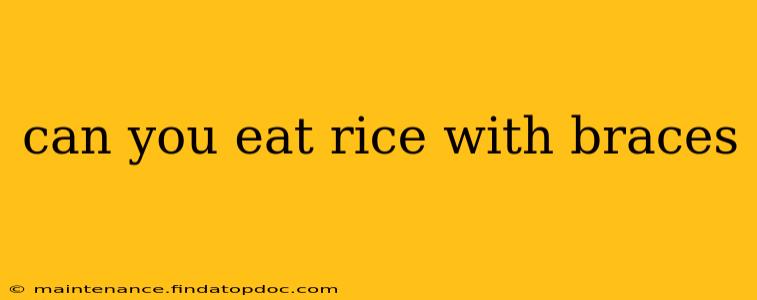Can You Eat Rice With Braces? A Comprehensive Guide
The question, "Can you eat rice with braces?" is a common one among orthodontic patients. The short answer is: yes, you can eat rice with braces, but with some important considerations. The texture and stickiness of rice, particularly sticky rice, can pose challenges for those wearing braces. This article will delve into the details, addressing common concerns and providing practical tips for enjoying rice while maintaining optimal oral health.
What are the risks of eating rice with braces?
Rice, especially sticky varieties, can easily get lodged between your teeth and brackets, increasing the risk of several oral health issues. This includes:
- Increased risk of cavities: Food particles trapped around your braces create a breeding ground for bacteria, leading to plaque buildup and potentially cavities.
- Gum irritation: Sticky rice can pull on your braces, potentially irritating your gums and leading to discomfort or even minor bleeding.
- Damage to braces: While less likely, extremely sticky rice could potentially damage or loosen your braces, prolonging your treatment time.
- White spot lesions: Trapped food particles can lead to demineralization of the tooth enamel, resulting in white spots that are aesthetically unappealing and can be a precursor to cavities.
What kind of rice is safest to eat with braces?
While no rice is entirely "safe" in the sense that it poses zero risk, some varieties are less problematic than others. Generally, loosely cooked, less sticky rice is the best option. This includes:
- Plain, cooked white rice: This is generally easier to remove from around your braces compared to sticky varieties.
- Brown rice: While slightly more textured than white rice, it's still manageable if properly cooked and chewed thoroughly.
- Avoid: Sticky rice (like sushi rice), risotto, rice pudding, and any rice dishes with thick, clinging sauces.
How can I minimize the risks of eating rice with braces?
Here are some practical strategies to help you enjoy rice safely while wearing braces:
- Thorough chewing: Chew your rice very well to break it down into smaller particles, making it easier to swallow and reducing the chance of it getting stuck.
- Careful rinsing: Rinse your mouth thoroughly with water immediately after eating rice to remove any trapped particles. Consider using an interdental brush to clean between your teeth and under your wires.
- Flossing: Floss regularly, especially after meals containing rice, to remove food particles that your toothbrush might miss.
- Regular dental checkups: Schedule regular checkups with your orthodontist to monitor your progress and address any potential issues promptly.
Can I eat rice if I have just gotten my braces on?
It's generally recommended to be extra cautious during the first few days after getting your braces. Your mouth will be more sensitive, and it's crucial to minimize the risk of irritation. Stick to softer foods for the initial period and gradually reintroduce rice as your mouth adjusts.
What other foods should I avoid with braces?
Besides sticky rice, you should generally avoid hard, crunchy, or chewy foods that could damage your braces or irritate your mouth. This includes things like hard candies, popcorn, nuts, ice, and tough meats. Your orthodontist will likely provide a more comprehensive list of foods to avoid during your treatment.
In conclusion, while you can eat rice with braces, mindful eating habits and good oral hygiene are crucial to minimize risks. By following these tips and maintaining regular dental care, you can enjoy your favorite rice dishes without compromising your orthodontic treatment. Remember to always consult your orthodontist for personalized advice.
